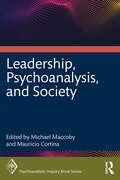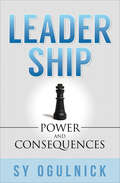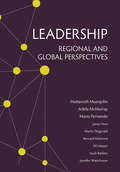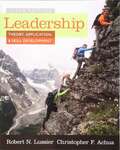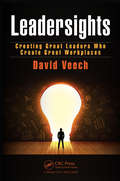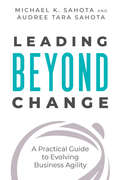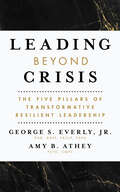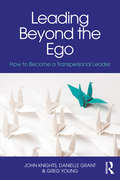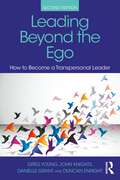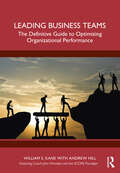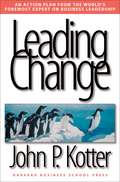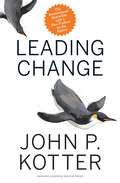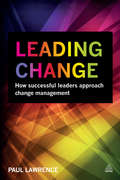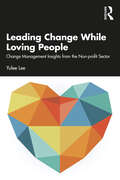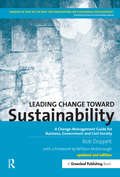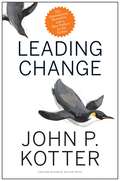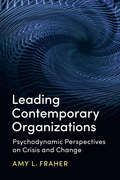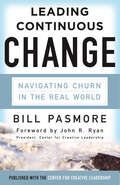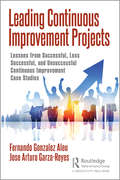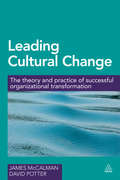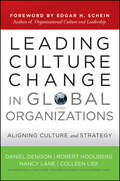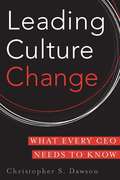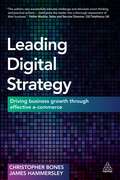- Table View
- List View
Leadership, Psychoanalysis, and Society (Psychoanalytic Inquiry Book Series)
by Michael MaccobyLeadership, Psychoanalysis, and Society describes leadership as a relationship between leaders and followers in a particular context and challenges theories of leadership now being taught. This book includes essays that view leadership from psychoanalytic, social psychological, sociological, evolutionary, developmental anthropological, and historical points of view to fully describe the complexity of leadership relationships and personalities. These essays analyze the different kinds of leadership needed in organizations; the development of Black Leadership that provides hope for people who have been oppressed; the difference between charismatic and inspirational leadership and the kind of training needed to develop leaders from diverse backgrounds who inspire followers and collaborate with them to further the common good. This book offers a guide to understanding the different types of leadership and will be of interest to business, government, health care, universities, and other organizations.
Leadership: Power and Consequences
by Sy OgulnickAdvice for leaders in every arena of life on facilitating problem solving, creativity, innovation, and a sense of mutual ownership. The answer to resolving a problem in any relationship is likely found where the power is located. Who are the true leaders, what are their expectations, and how well do they communicate with those they lead? And, how well and candidly do those significant to the leader communicate back? This is where trust, safety and respect play a huge role in how the relationship plays out and either grows, mutually, or is destructive, mutually. Most leaders tend to communicate badly, have unspoken or inflexible expectations towards those they lead and blame others for their own failings. Leadership: Power and Consequences confronts this problem of leadership directly and clearly by using Sy Ogulnick&’s personally experienced stories. He clearly describes the path leaders must take if they are to personally grow, to understand themselves better, and to contribute to the growth of those they lead. When authentic communication takes place between those in power and those immediately at the effect of this power, trust, safety, and respect are felt by everyone involved. This must be found in the environment or genuine dialogue between them is impossible and will not, even at the point of a gun, take place. And it is the leaders who are primarily responsible for the creation of the environment. Words do not make it so, but action (behavior of the leaders) does.
Leadership: Regional and Global Perspectives (Leadership Symposia Ser. #Vol. 1)
by Mario Fernando Nuttawuth Muenjohn James Hunt Adela McMurray Martin Fitzgerald Bernard McKenna Ali Intezari Sarah Bankins Jenny WaterhouseWhether leading a small team or a multinational corporation, within the public or private sector, a thorough understanding of the theory and best practice of leadership is essential. Leadership: Regional and Global Perspectives provides a fresh approach to leading in contemporary business environments. The theory component is complemented by a focus on strategic application. Each chapter features case studies highlighting the practical application of key concepts by organisational leaders in the Australasian region. Case studies at the end of each chapter provide a more nuanced analysis of the theory, while accompanying questions encourage students to think critically. Learning is further supported through the inclusion of learning objectives, key terms, further readings and review questions. An extensive bank of web resources is available to lecturers to support their teaching. Written by an expert team of academics from across Australia, Leadership gives students the tools they need to navigate their leadership journey.
Leadership: Theory, Application, And Skill Development
by Robert N. Lussier Christopher F. AchuaThe text constantly puts the student in the leadership role engaging them in applying the concepts, as well as providing step-by-step behavior models for effectively handling leadership functions. LEADERSHIP's innovative three-pronged approach provides the greatest array and quality of learning opportunities.
Leadership: Theory, Application, And Skill Development
by Robert N. Lussier Christopher F. AchuaThe most practical leadership textbook on the market, LEADERSHIP 6e uses a unique three-pronged approach to teach leadership concepts and theory. The authors combine traditional theory with cutting-edge leadership topics in a concise presentation packed with real-world examples. The text puts students in the leadership role, engaging them in applying the concepts and providing step-by-step behavior models for effectively handling leadership functions.
Leadersights: Creating Great Leaders Who Create Great Workplaces
by David VeechLove, learn, let go. Three decisions. Three actions. Three habits. Together, these offer leaders insight (Leadersights) into the true nature of leadership and can create the type of workplace that can thrive in a demanding future. Leadersights: Creating Great Leaders Who Create Great Workplaces focuses on how organizations of all types can create a leader-development system that defines critical leader behaviors, provides simple techniques for building and improving the skills that drive those behaviors, and establishes a mechanism for monitoring and enforcing those behaviors. This book details how leaders can do the same for their employees; defining and promoting behaviors required for sustaining continuous change. In addition, it synthesizes current research on change, servant leadership, group and team dynamics, job satisfaction, intrinsic motivation, psychological flow, and individual self-efficacy. If you are stuck in a culture of compliance where an increasingly frustrated workforce continues to rely too much on leaders to solve problems, this book will guide you by: Focusing on the critical few leadership skills that provide better results Demonstrating proven improvement techniques, tools, and structures for higher satisfaction levels in colleagues Offering a new leadership model blending existing theories into an integral structure Explaining complex human systems in plain language and how they align with Lean principles Providing several "Leadersights" – simple suggestions for immediate improvement You will understand how to create the structure necessary to engage leaders and colleagues while driving new behavior and culture change. The author builds an effective leader development system based on current research on change, leadership, group and team dynamics, job satisfaction, intrinsic motivation, psychological flow, and self-efficacy to create the kind of workplace where people love coming to work and where they become better thinkers, leaders, and teachers.
Leading Beyond Change: A Practical Guide to Evolving Business Agility
by Michael Sahota Audree Tara SahotaThis guide shows readers how to transform a traditional organization into an evolutionary one with a framework and mindset that offer a new way of leading and approaching change. Now more than ever, society is demanding change, and organizations are being asked to shift into more conscious and agile business practices. Yet, most of what people believe about leadership, effective workplaces, and how to create lasting change is either incomplete or outright incorrect. And even if the desire to change is there, understanding of how to achieve it is elusive. This book holds the key. It introduces the Shift Evolutionary Leadership Framework (SELF), which helps leaders create the understanding and application needed to evolve high performance. At the core of the book are dozens of business patterns that cut across seven dimensions of organizational functioning. The traps of traditional organizations are contrasted with the high-performance practices of evolutionary organizations. Authors Michael Sahota and Audree Tata Sahota explain the steps of leading beyond change—evolving beyond servant leadership to make the inner shift needed to unlock the practical skills and techniques.Whether readers call this shift business agility, Teal Agility, evolutionary, or the future of work, it is possible to create high-performing organizations filled with energized people who are able to surf the waves of change.
Leading Beyond Crisis: The Five Pillars of Transformative Resilient Leadership (APA LifeTools Series)
by Dr. George S. Everly Jr. Amy B. AtheyIt's hard enough to lead in good times. It's even harder to lead in a crisis. This book teaches the art and science of transformative resilient leadership, a unique leadership style that focusses on spotting the opportunities that emerge from times of adversity, and leverages them to foster resilience and growth. With over 70 years of combined experience training leaders in business, military, sports, and other high-pressure settings, psychologists George S. Everly, Jr., and Amy B. Athey have garnered unparalleled insight into how the best leaders navigate the worst. This book distills their wisdom into practical, reader-friendly chapters and profiles leaders from classical and modern history who demonstrate the five pillars of transformative resilient leadership. Whether you are a CEO, frontline manager, director, teacher, coach, or other leader, you can learn to seize the unique opportunities afforded by crisis to achieve organizational, community, and personal growth.
Leading Beyond the Ego: How to Become a Transpersonal Leader
by John Knights Danielle Grant Greg YoungThe traditional leadership styles of the past are underperforming in a world of continuous transformation. Those that recognise this and learn how to lead beyond their ego will become emotionally intelligent and ethical leaders who are able to build strong, collaborative relationships, and create a caring, sustainable and performance enhancing environment. This new book is rooted in the experience of senior managers and the latest discoveries in neuroscience. It gives you the tools to overcome the challenges faced by new organisational and commercial structures, technological developments, increased diversity and rapid globalisation and succeed. An essential read for current and aspiring organisational leaders, HR professionals, executive coaches and mentors, Leading Beyond the Ego is a vital point of reference for anyone in a leadership position and who wants to embrace this new world and Transpersonal Leadership.
Leading Beyond the Ego: How to Become a Transpersonal Leader
by Greg YoungBuilding on the concept of Transpersonal Leadership, Leading Beyond the Ego offers a practical approach to becoming an authentic, ethical, caring and more effective leader.Rooted in the experience of senior organisational leaders and mentors, readers embark on a personal journey to innovate and enhance their leadership skills. Reflections are rooted in recent advances in neuroscience and acknowledge the challenges faced by leaders in light of new organisational and commercial structures, in a volatile and uncertain world. The reader is supported to transcend individual ego to develop beyond emotional intelligence to a higher level of consciousness and ethical behaviour; able to build strong, collaborative relationships and to create a caring, sustainable and performance-enhancing culture.Emboldened by the changing world and inspired by leaders around us, this new edition is enriched by new chapters on leading with purpose; managing (and benefitting from) diversity; health, resilience and well-being; sustainable leadership; and leading in complex adaptive systems. Every other chapter has been thoroughly updated and upgraded in the light of experience and feedback from readers, including a new section in key chapters challenging readers to put theory into practice.Learn how to lead beyond the ego! An essential manual for current and aspiring organisational leaders, HR professionals, executive coaches and mentors, Leading Beyond the Ego is a vital reference source for anyone in a position of leadership.
Leading Business Teams: The Definitive Guide to Optimizing Organizational Performance
by Andrew Hill William S. KaneIn a rapidly changing world, businesses must create a high-performing, metrics-driven workplace environment characterized by respect, inclusion, teamwork, innovation, and overall harmony—and it must be manageable and sustainable. This book shows that returning to managerial basics will provide the way forward, as exemplified by legendary UCLA basketball coach John Wooden, the model for a new people management pathway: the SCORE paradigm. Generally considered the greatest coach in history, John Wooden’s recipe for team success was unique, culture-based, and ahead of its time. Building upon Wooden’s 21 coaching principles and his own 35 years of experience as a human resources leader, Bill Kane has created the SCORE framework to guide people managers in creating and nurturing effective teams and steering their organizations through times of change: • Staffing: Attracting and selecting talent • Cultivating culture: Defining how people should interact • Organizing and planning: The need for direction and focus • Reinforcing desirable behavior: Managing performance • Engaging your team: A leader’s role and responsibility Enlivened with stories from the careers of Coach Wooden, Andy Hill (a three-time national champion under Coach), and the author, the book clearly explains why each coaching principle works in practice and provides examples of success, as well as pitfalls to avoid. Readers will learn how to get the right people on their team, create meaningful participative and inclusive management practices, build a winning organizational culture, and achieve heightened results. New and experienced people managers and leaders in corporate settings, as well as business and organizational psychology students, will appreciate this timeless reference tool, a roadmap to help people managers—as their own “work-in-progress”—develop strategies for success based upon a proven and simple model.
Leading Change
by John P. KotterJohn Kotter examines the efforts of more than 100 companies to remake themselves into better competitors. He identifies the most common mistakes leaders and managers make in attempting to create change and offers an eight-step process.
Leading Change
by Paul LawrenceIt is often claimed that 70% of organizational change efforts fail, despite the popularity of linear change models. However these linear approaches to change are often based on the premise that change is predictable and straightforward, when actually change is complex, with the 'human' element often changing the functioning of the organizational system as a whole. Leading Change provides the practical framework that allows leaders to actively engage with a complex adaptive system to bring about successful organizational change. Supported by academic research, and grounded with a range of examples and cases, the book offers a genuine, viable alternative to existing approaches.
Leading Change While Loving People: Change Management Insights from the Non-profit Sector
by Yulee LeeFilled with stories of successful social change leadership in diverse contexts, this book demonstrates that the best change agents love the people involved most of all. Many people have experienced change trauma under leaders whose agenda was more important than anything—or anyone—else, so it is no wonder that change failure rates are often reported as 40% to 70%. There is another way: change leaders who work to solve some of the world’s toughest problems realize that working with others is necessary to accomplishing a social change mission. This book shares the insights of those who lead social change in the non-profit sector, and shows how they catalyze the urgency for, connect people toward, and continue momentum for a desired change. Their stories reveal three interconnected dimensions of leading change: people (relationships for change), process (communicating for change), and purpose (the change mission). Ultimately, readers will learn that strengthening social capital (people), centering marginal voices (process), and aligning stakeholders to the change mission (purpose) are critical to the work of change agents who value relationships. Leveraging well-known models and elevating little-heard voices, this book flips the script of conventional leadership books by focusing on non-profit social change leaders rather than business titans. Students, managers, and leaders across sectors will value these new insights, along with a relationally focused process and strategy for leading change and practical tips and recommendations for implementation.
Leading Change toward Sustainability: A Change-Management Guide for Business, Government and Civil Society
by Bob DoppeltAs the world struggles to cope with the growing threat of a global carbon crisis, Doppelt has revised one of the best books ever written about change management, leadership and sustainability to focus on de-carbonisation. Doppelt's research, presented in this hugely readable book, demystify the sustainability-change process by providing a theoretical framework and a methodology that managers can use to successfully transform their organisations to embrace sustainable development. Filled with case examples, interviews and checklists on how to move corporate and governmental cultures toward sustainability, the book argues that the key factors that facilitate change appear in the successful efforts at companies such as AstraZeneca, Nike, Starbucks, IKEA, Chiquita, Interface, Swisscom and Norm Thompson and in governmental efforts such as those in the Netherlands and Santa Monica in California. For these and other cutting-edge organisations, leading change is a philosophy for success. Leading Change toward Sustainability has been used by change leaders around the world to guide their internal global warming and sustainability organisational change initiatives. This new edition is essential reading for leaders from all types of organisations.
Leading Change, With a New Preface by the Author
by John P. KotterThe international bestseller-now with a new preface by author John Kotter.Millions worldwide have read and embraced John Kotter's ideas on change management and leadership.From the ill-fated dot-com bubble to unprecedented M&A activity to scandal, greed, and ultimately, recession-we've learned that widespread and difficult change is no longer the exception. It's the rule. Now with a new preface, this refreshed edition of the global bestseller Leading Change is more relevant than ever.John Kotter's now-legendary eight-step process for managing change with positive results has become the foundation for leaders and organizations across the globe. By outlining the process every organization must go through to achieve its goals, and by identifying where and how even top performers derail during the change process, Kotter provides a practical resource for leaders and managers charged with making change initiatives work. Leading Change is widely recognized as his seminal work and is an important precursor to his newer ideas on acceleration published in Harvard Business Review.Needed more today than at any time in the past, this bestselling business book serves as both visionary guide and practical toolkit on how to approach the difficult yet crucial work of leading change in any type of organization. Reading this highly personal book is like spending a day with the world's foremost expert on business leadership. You're sure to walk away inspired-and armed with the tools you need to inspire others. Published by Harvard Business Review Press.
Leading Change: How Successful Leaders Approach Change Management
by Paul LawrenceIt is often claimed that 70% of organizational change efforts fail, despite the popularity of linear change models. However these linear approaches to change are often based on the premise that change is predictable and straightforward, when actually change is complex, with the 'human' element often changing the functioning of the organizational system as a whole. Leading Change provides the practical framework that allows leaders to actively engage with a complex adaptive system to bring about successful organizational change. Supported by academic research, and grounded with a range of examples and cases, the book offers a genuine, viable alternative to existing approaches.
Leading Contemporary Organizations: Psychodynamic Perspectives on Crisis and Change
by Amy L. FraherWhy do organizations fail? What hinders otherwise responsible leaders from recognizing looming disasters? What prevents well-intentioned people from responding properly to an emerging crisis? Using systems psychodynamics to analyze an array of international crises, Amy L. Fraher explores ethical challenges at Silicon Valley tech companies, the Wall Street implosions that led to the 2008 financial industry crash, and a wide range of social crises, policy failures, and natural disasters, offering a crisis management philosophy applicable in diverse settings. Rather than viewing crises as anomalies that cannot be anticipated, Fraher persuasively argues that crises can, and should, be embraced as naturally occurring by-products of any organization's change management processes. If leaders do not proactively manage organizational change, they will inevitably manage crisis instead. This accessible textbook will appeal to business students and researchers studying leadership, change and crisis, as well as progressive-minded business leaders keen to improve their own organizations.
Leading Continuous Change: Navigating Churn in the Real World
by Bill PasmoreMost change efforts fail because most change methods are built to deal with single challenges in a nice, neat, linear way. But leaders know that today, pressures for change don't come at you one at a time; they come all at once. It's like riding a roller coaster: sudden drops, jarring turns, anxious climbs into the unknown. Drawing on his years of experience at the Center for Creative Leadership and Columbia University, Bill Pasmore offers a four-part model and four mindsets that allow leaders to deal with multiple changes simultaneously without drowning in the churn. The first step, Pasmore says, is to Discover which external pressures for change are the most necessary to address. The key here is to think fewer-step away from the buffet of possibilities and pinpoint the highest-impact options. Then you need to Decide how many change efforts your organization can handle. Here the mindset is to think scarcer-you have only so many people and so many resources, so how do you best use them? Once you've figured that out, it's time to Do-and here you want to think faster. Streamline processes and engage in rapid prototyping so you can learn quickly and cost-effectively. The last step is to Discern what worked and what didn't, so think smarter-develop metrics, identify trends, and make sure learnings are disseminated throughout the organization.For each stage of the process, Pasmore offers detailed advice, practical tools, and real-world examples. This book is a comprehensive guide to navigating change the way it happens now.
Leading Continuous Improvement Projects: Lessons from Successful, Less Successful, and Unsuccessful Continuous Improvement Case Studies
by Jose Arturo Garza-Reyes Fernando Gonzalez AleuThis book is a reference for continuous improvement project (CIP) leaders/facilitators in manufacturing and service organizations, students (undergraduate and graduate), academics responsible for managing senior projects (Capstone Projects) and teaching quality courses, and researchers interested in how organizations could produce more effective and efficient continuous improvement initiatives and projects. The authors collected and analyzed information and results from CIPs they facilitated or co-advised, such as the improvement of the service level in a bottle manufacturing organization, reduction of changeover in a brewery manufacturing organization, reduction of ambulance response time, and reduction of scrap in a steel transformation manufacturing organization. Many of the CIPs were previously part of award-winning white papers documenting critical improvements. Throughout this book, readers will learn: different types of CIPs metrics to identify successful CIPs the 53 factors related to CIPs success how to manage CIPs behaviors to achieve outstanding results from CIPs. Three of the chapters are supplemented with three or more case studies. In addition, the final chapter includes a list of behaviors expected from directors, continuous improvement managers, CIP leaders/facilitators, and CIP team members to obtain the major benefits from CIPs.
Leading Cultural Change
by David Potter James MccalmanWith coverage of the major theories and concepts alongside diagnostic tools and a practical framework for implementation, Leading Cultural Change will help the reader analyse and diagnose their current organizational culture, become aware of the key challenges and how to overcome them and learn how to adapt their leadership style, ensuring they are fit to lead a cultural change programme. Taking in core topics such as change context, language and dialogue as a key cultural process and the change team process, it uses a longitudinal case study of Cordia, a public sector organization transitioning into an LLP, to enhance learning and understanding. Leading Cultural Change is a unique text, rooted in behavioural sciences, which explores the topic as an organizational necessity to achieving sustained competitive advantage.
Leading Culture Change in Global Organizations
by Daniel Denison Colleen Lief Nancy Lane Robert HooijbergFilled with case studies from firms such as GT Automotive, GE Healthcare China, Vale, Dominos, Swiss Re Americas Division, and Polar Bank, among others, this book (written by Dan Denison and his co-authors) combines twenty years of research and survey results to illustrate a critical set of cultural dynamics that firms need to manage in order to remain competitive. Each chapter uses a case as a means to illustrate an important aspect of culture change focusing on seven common culture-change dilemmas including creating a strategic alignment, keeping strategy simple, and more.
Leading Digital Strategy
by Christopher Bones James HammersleyFor a business to thrive competitively in today's marketplace, it needs to have an effective e-commerce channel. Getting it right opens up new markets and opportunities; getting it wrong leads to declining revenues and profitability. To ensure effectiveness, business leaders and decision-makers must understand how e-commerce channels work to make the best strategic choices for their business. Drawing on experience in consulting to large complex organisations and ground-breaking primary research with senior executives from leading corporations, Leading Digital Strategy creates a convincing case for action and offers practical strategies, methodologies and models to improve the effectiveness of a company's online offering. It explores how to align organizational structure with wider goals and implement a customer-centric culture. With coverage of the key digital trends, tools and technologies affecting business today, it provides a practical framework for multi-channel success. This book challenges leaders to become as fluent and creative in digital as they are in finance, sales and marketing, and equips them to choose the right strategy and the right people to make it happen. With strategies for improved operational performance and enhanced engagement from senior management, Leading Digital Strategy gives readers the power to drive forward effective digital initiatives and realize rewarding opportunities for change.
